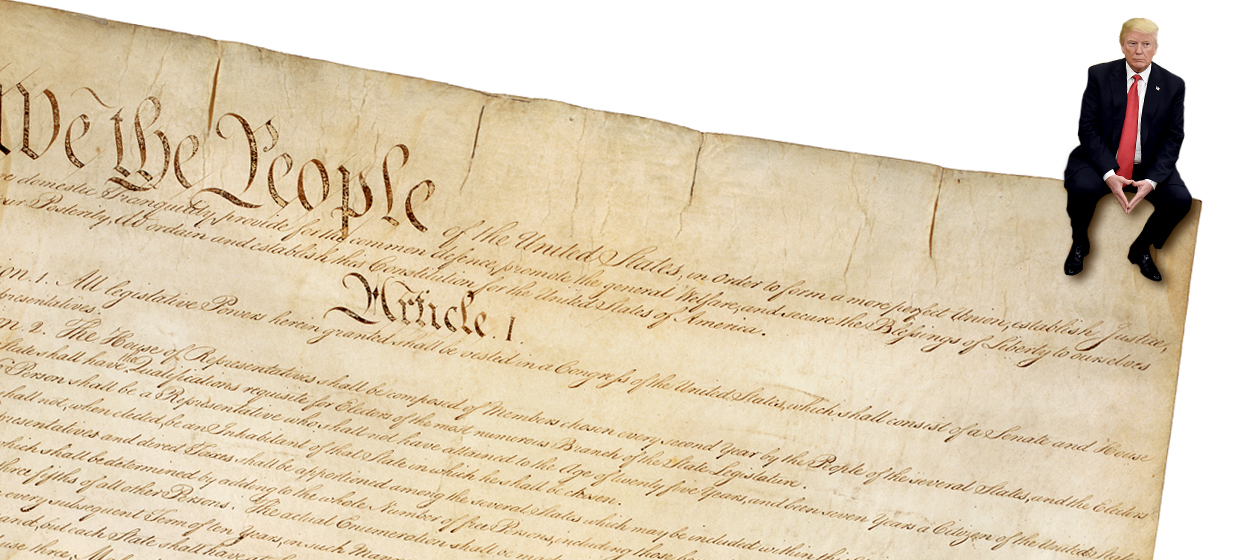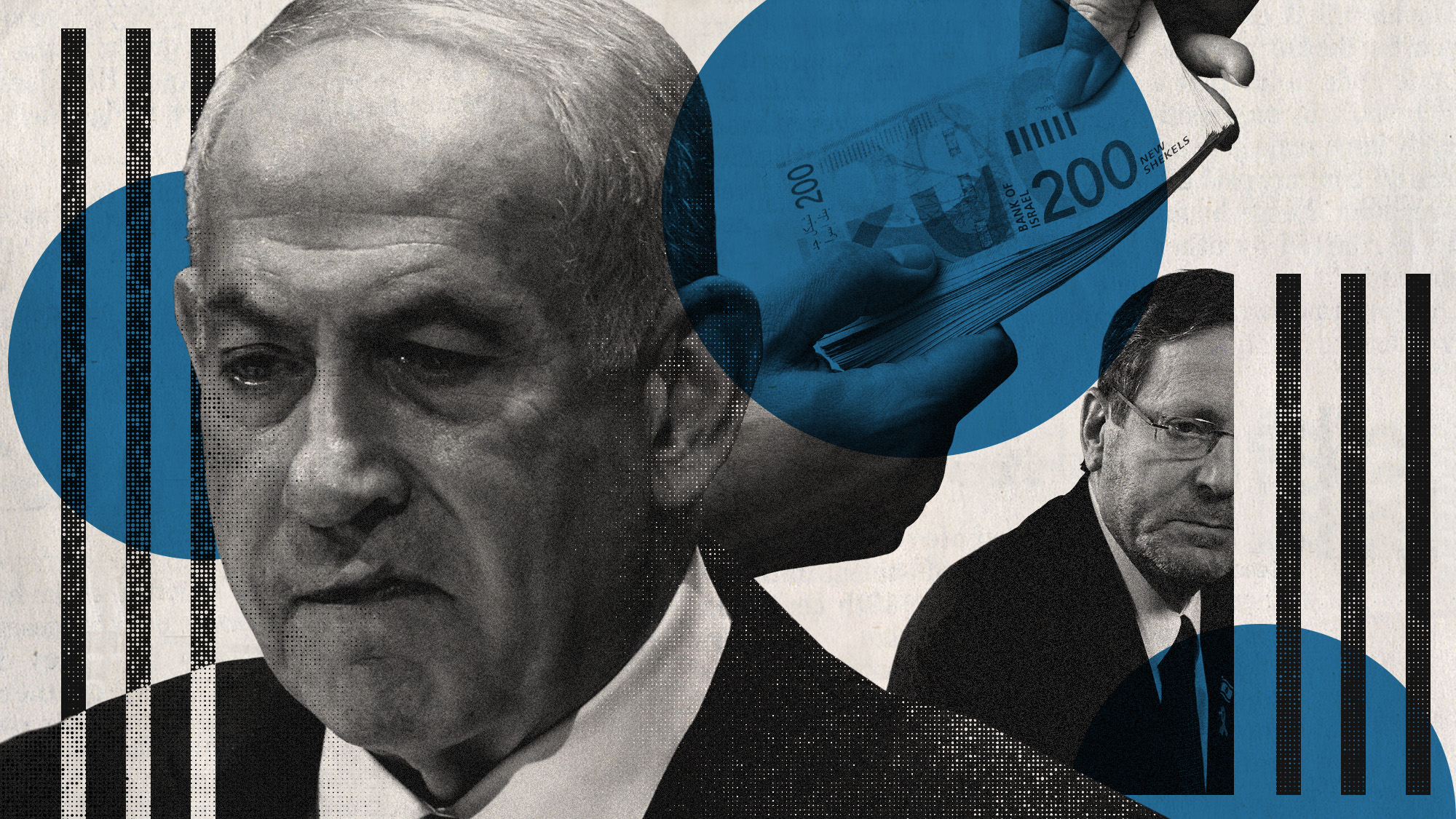Trump teeters on the constitutional cliff
The president has brought America to the brink of a terrifying political crisis. And he's masterfully manipulated millions of people into believing he's right.


America is drawing closer to its most dangerous crisis since the Civil War.
The president, through his lawyers and his emotionally unmoored Twitter account, is laying the groundwork for an inevitable challenge to Special Counsel Robert Mueller's investigation by claiming the broadest possible interpretation of executive power and privilege ever asserted by a sitting president. The Trump team's determination to place not just President Trump, but the very office of the president, above the laws of the United States threatens not just the Mueller investigation but the very idea of democracy itself. It will confirm and legitimize this country's long drift into electoral authoritarianism.
President Trump's hallucinatory Monday morning tweet — in which he claimed, "As has been stated by numerous legal scholars, I have the absolute right to PARDON myself, but why would I do that when I have done nothing wrong?" — was merely the culmination of a long process that has resulted in the president's assertion of limitless authority. The statement featured the president's favorite logical fallacy, which is to appeal to unnamed experts. "Many people are saying" is how he normally puts it, which is a way of turning an isolated opinion into a claim of broad authority. But his most chilling assertion is right there in plain sight: the idea that if he had done something wrong, he could and would pardon himself.
The Week
Escape your echo chamber. Get the facts behind the news, plus analysis from multiple perspectives.

Sign up for The Week's Free Newsletters
From our morning news briefing to a weekly Good News Newsletter, get the best of The Week delivered directly to your inbox.
From our morning news briefing to a weekly Good News Newsletter, get the best of The Week delivered directly to your inbox.
President Trump and his allies have recognized one simple fact for a year now: The Mueller investigation is probably going to consume the rest of the president's term, one way or another. Better, they gambled, to relentlessly discredit the investigation than take the risk of ending it altogether or stepping aside and letting it play out. Hence the president's daily and fact-free impugning of Mueller and his team ("13 Angry and conflicted Democrats"), the constant, hysterical assertion that NO COLLUSION took place, and the claim that the entire probe is, as he now calls it, a WITCH HUNT HOAX.
It's why nearly every hour of the past 14 months has been loudly punctuated by the president's allies at Fox News, the de facto state television of this administration, desperately outlining an alternate-reality conspiracy theory about how outgoing Obama officials decided they would use the "deep state" to take down the incoming Trump administration. It's why Rudy Guiliani is on TV making increasingly deranged statements, including the recent puzzler that the president could have shot former FBI Director James Comey on Fifth Avenue and not be prosecuted for it. While he added that the president would be impeached "the next day" for Comey's cold-blooded assassination (better check with Paul Ryan and Mitch McConnell on that one, pal), the claim rests on the still-legally-untested assertion by the Office of Legal Counsel inside the Justice Department that the president can't be prosecuted while in office because it would interfere with his or her duties.
Trump's twisted disinformation campaign has been spectacularly successful. A recent CBS poll found that 53 percent of Americans believes the investigation is "politically motivated," versus the 44 percent who believe it's "justified." Other surveys show slim majority support for the probe, but that the issue now breaks down along standard partisan lines. This is what the Trump team wanted all along.
The president's musings about the pardon power, and his performative, partisan exoneration of people like former Arizona sheriff Joe Arpaio and the professional troll and far-right conspiracy Dinesh D'Souza — people who were obviously guilty of the crimes they were convicted of (D'Souza pleaded guilty!) — were unsubtle messages to everyone involved in the Russia probe: Keep your cake hole locked and the president will grant you absolution with his limitless powers. At this point, it isn't difficult to imagine the president pardoning everyone from Paul Manafort to Michael Flynn, all the while maintaining that their trials were part of the witch hunt. The president doesn't care about these people any more than he did about the legions of suckers and sycophants who have ended up on the wrong side of the president's lifetime of grifts and confidence games. It's a dry run, folks. If it works, the president and his enablers will perform this very same magic PR trick on the once-unthinkable gambit of pardoning himself.
A free daily email with the biggest news stories of the day – and the best features from TheWeek.com
The framers, needless to say, did not envision the inhabitant of their new executive branch pardoning himself for crimes committed while in office. Not even Richard Nixon was craven enough to raise the possibility of a self-pardon, leaving the dirty work to his successor Gerald Ford, whose exoneration of the outgoing president did as much as any single act in the last century to contribute to the runaway lawlessness of the American presidency.
That precedent was made more open and expansive when President George H.W. Bush pardoned six figures from the Reagan-era Iran-Contra scandal, including former Defense Secretary Caspar Weinberger, who was about to go on trial. We now have a long string of pardons, including Trump's pardon of Scooter Libby, which have made it very clear that you basically can do whatever you want as a member of the executive branch of the United States as long as you are or are appointed by a Republican. Inasmuch as the laws apply to you, they will eventually be waived for your benefit, so that you can slide comfortably into private life and then pretend for the rest of your life like nothing ever happened.
But those parsing the can-he-or-can't-he of self-pardons are almost entirely missing the point. The Constitution clearly doesn't prohibit it in the unambiguous way that it should, and that's all that matters to the Trump administration.
The president's endgame in the Mueller investigation was revealed not in a tweet, but rather in a memo. On Saturday, The New York Times published news of a confidential memo written earlier this year by the president's legal team as part of an effort to avoid Mueller's subpoena. Even by the standards of the Trump era, the contents of that memo were remarkable. The most explosive claim was that the president, by virtue of his constitutional authority, cannot actually obstruct justice. His lawyers wrote: "Every action that the president took was taken with full constitutional authority pursuant to Article II of the United States Constitution. As such, these actions cannot constitute obstruction, whether viewed separately or even as a totality."
Just in case you find that wording too dense, the authors were even clearer earlier in the letter: "It remains our position that the president's actions here, by virtue of his position as the chief law enforcement officer, could neither constitutionally nor legally constitute obstruction because that would amount to him obstructing himself, and that he could, if he wished, terminate the inquiry, or even exercise his power to pardon if he so desired."
One thing that has been made very clear over the past 18 months is the need to revise America's Constitutional framework. As in so many other areas, the Constitution's studied ambiguity has become a hammer used by the executive branch to smash opposition to its designs. The Constitution's outline of the president's pardon power is extraordinarily brief: The president "shall have Power to Grant Reprieves and Pardons for Offences against the United States, except in Cases of Impeachment." The provision was not uncontroversial. George Mason worried that the pardon power "may be sometimes exercised to screen from punishment those whom he had secretly instigated to commit the crime and thereby prevent a discovery of his own guilt," which is more or less precisely the predicament in which we find ourselves today.
Likewise, the Constitution provided no roadmap for offices of the executive branch to hold the president and his associates accountable for their actions. In fact, when you think about it, it really is an incredibly awkward arrangement for the president to appoint and then to retain the technical right to fire members of the executive branch who might be responsible for investigating him. Here again we are trapped by the mistakes and oversights of people who died 200 years ago.
In a functioning democracy, the parties would be able to come together to design a workaround for the Constitution's flaws, and then steward the fix through the unwieldy amendment process. The pardon power could be circumscribed so that it may no longer by used on those convicted of committing crimes inside the executive branch itself or in the service of the president or his party. Firing the attorney general or the FBI director could require supermajority concurrence from Congress.
But America is not currently a functioning democracy, but an evolving kleptrocracy whose apparatchiks have no interest in bringing order to any of this chaos.
David Faris is a professor of political science at Roosevelt University and the author of "It's Time to Fight Dirty: How Democrats Can Build a Lasting Majority in American Politics." He's a frequent contributor to Newsweek and Slate, and his work has appeared in The Washington Post, The New Republic and The Nation, among others.
-
 ‘They’re nervous about playing the game’
‘They’re nervous about playing the game’Instant Opinion Opinion, comment and editorials of the day
-
 Will Netanyahu get a pardon?
Will Netanyahu get a pardon?Today's Big Question Opponents say yes, if he steps down
-
 December’s books feature otherworldly tales, a literary icon’s life story and an adult royal romp
December’s books feature otherworldly tales, a literary icon’s life story and an adult royal rompThe Week Recommends This month's new releases include ‘The Heir Apparent’ by Rebecca Armitage and ‘Tailored Realities’ by Brandon Sanderson
-
 Has Zohran Mamdani shown the Democrats how to win again?
Has Zohran Mamdani shown the Democrats how to win again?Today’s Big Question New York City mayoral election touted as victory for left-wing populists but moderate centrist wins elsewhere present more complex path for Democratic Party
-
 Millions turn out for anti-Trump ‘No Kings’ rallies
Millions turn out for anti-Trump ‘No Kings’ ralliesSpeed Read An estimated 7 million people participated, 2 million more than at the first ‘No Kings’ protest in June
-
 Ghislaine Maxwell: angling for a Trump pardon
Ghislaine Maxwell: angling for a Trump pardonTalking Point Convicted sex trafficker's testimony could shed new light on president's links to Jeffrey Epstein
-
 The last words and final moments of 40 presidents
The last words and final moments of 40 presidentsThe Explainer Some are eloquent quotes worthy of the holders of the highest office in the nation, and others... aren't
-
 The JFK files: the truth at last?
The JFK files: the truth at last?In The Spotlight More than 64,000 previously classified documents relating the 1963 assassination of John F. Kennedy have been released by the Trump administration
-
 'Seriously, not literally': how should the world take Donald Trump?
'Seriously, not literally': how should the world take Donald Trump?Today's big question White House rhetoric and reality look likely to become increasingly blurred
-
 Will Trump's 'madman' strategy pay off?
Will Trump's 'madman' strategy pay off?Today's Big Question Incoming US president likes to seem unpredictable but, this time round, world leaders could be wise to his playbook
-
 Democrats vs. Republicans: who are US billionaires backing?
Democrats vs. Republicans: who are US billionaires backing?The Explainer Younger tech titans join 'boys' club throwing money and support' behind President Trump, while older plutocrats quietly rebuke new administration
